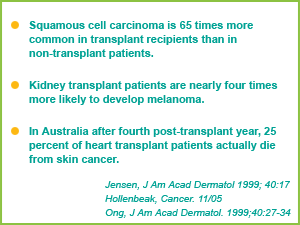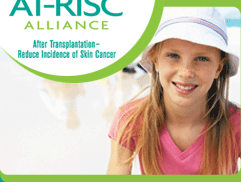| Skin cancer is the most common cancer affecting solid organ transplant recipients, affecting up to 70 percent of patients within 20 years, and is the result of intense immunosuppressive regimens. |
 |
| While skin cancer can be prevented and easily treated when caught early, a subset of high-risk patients is severely affected. These patients develop dozens or even hundreds of skin cancers per year, which reduces their quality of life and can be life-threatening. |
 |
| Studies of skin cancer education for transplant recipients have shown that patients have poor knowledge even after receiving instruction at dismissal from the hospital. |
 |
| The key to protection is the patient – who through repetitive education from various sources (e.g. their transplant team, dermatologist and organizations like AT-RISC) will understand their increased risk for skin cancer, use effective sun protection methods, know how to recognize possible skin cancers, and seek prompt treatment that can literally save their life. |
 |
 |
 |
|
 |
|







